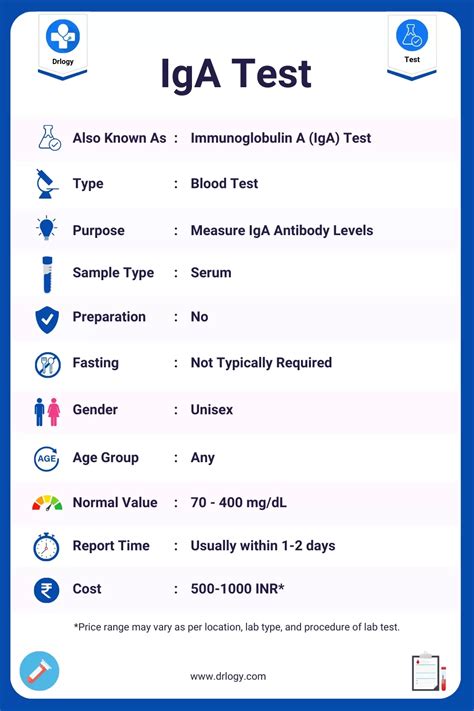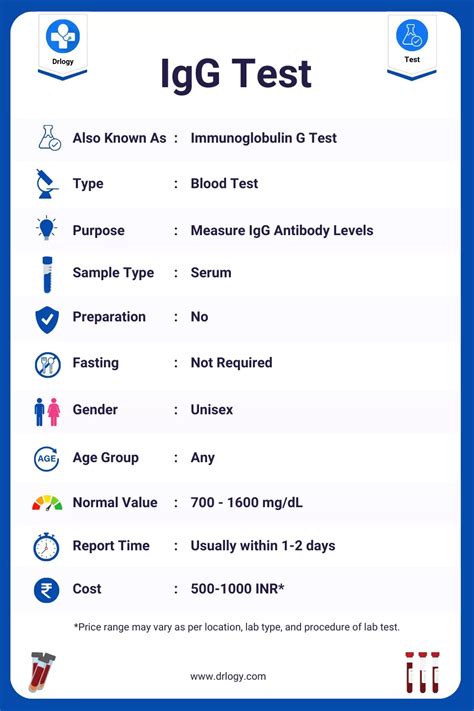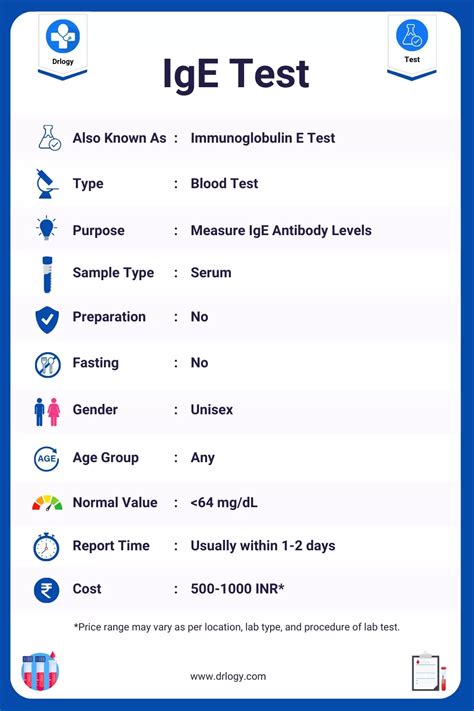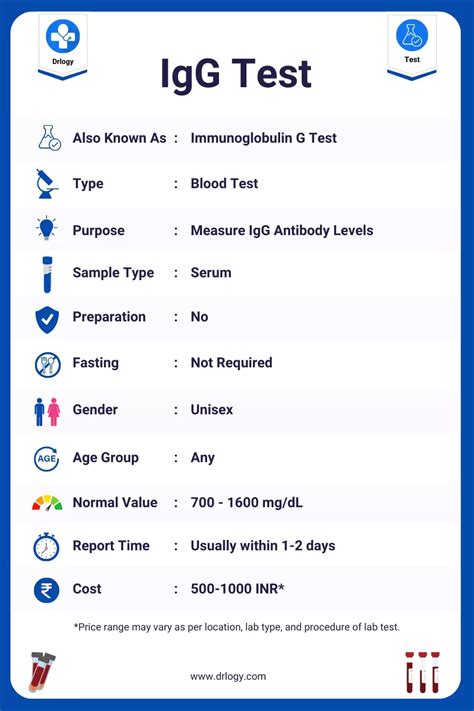Intro
Understand your Ig blood test results, including immunoglobulin levels, antibody tests, and infection diagnosis, to manage immune system disorders and infections effectively.
Immunoglobulin, or Ig, blood tests are a crucial diagnostic tool used to assess the levels of different types of antibodies in the blood. These antibodies, also known as immunoglobulins, play a vital role in the body's immune system, helping to fight off infections and diseases. Understanding Ig blood test results can provide valuable insights into an individual's immune function and help diagnose various conditions.
The importance of Ig blood tests lies in their ability to detect abnormalities in antibody levels, which can indicate a range of health issues, from infections and autoimmune disorders to certain types of cancer. By analyzing the results of an Ig blood test, healthcare professionals can gain a better understanding of a patient's immune system and develop effective treatment plans. In this article, we will delve into the world of Ig blood tests, exploring what they measure, how they are interpreted, and what the results can reveal about an individual's health.
Ig blood tests measure the levels of five different types of immunoglobulins: IgA, IgD, IgE, IgG, and IgM. Each type of antibody has a unique function and plays a distinct role in the immune system. For example, IgA antibodies are primarily found in mucosal areas, such as the respiratory and gastrointestinal tracts, where they help to neutralize pathogens. IgE antibodies, on the other hand, are involved in allergic reactions and are often elevated in individuals with allergies or asthma. Understanding the different types of antibodies and their functions is essential for interpreting Ig blood test results.
Understanding Ig Blood Test Results

Interpreting Ig blood test results requires a comprehensive understanding of the different types of antibodies and their normal ranges. The results are typically reported in units of milligrams per deciliter (mg/dL) or grams per liter (g/L). Abnormal results can indicate a range of health issues, from infections and autoimmune disorders to immunodeficiency diseases. For example, low levels of IgG antibodies can indicate an increased risk of infections, while elevated levels of IgE antibodies can suggest an allergic reaction.
Normal Ranges for Ig Antibodies
The normal ranges for Ig antibodies vary depending on the type of antibody and the individual's age and health status. The following are general guidelines for normal ranges: * IgA: 70-400 mg/dL * IgD: 0.5-140 mg/dL * IgE: 0-100 IU/mL * IgG: 700-1,600 mg/dL * IgM: 40-230 mg/dLTypes of Ig Blood Tests

There are several types of Ig blood tests, each designed to measure specific aspects of the immune system. Some common types of Ig blood tests include:
- Total IgE test: measures the total level of IgE antibodies in the blood
- Specific IgE test: measures the level of IgE antibodies against specific allergens
- IgG subclass test: measures the levels of different subclasses of IgG antibodies
- IgA test: measures the level of IgA antibodies in the blood
Ig Blood Tests for Diagnostic Purposes
Ig blood tests are used to diagnose a range of health conditions, including: * Infections: such as pneumonia, meningitis, and sepsis * Autoimmune disorders: such as rheumatoid arthritis, lupus, and multiple sclerosis * Allergies: such as food allergies, seasonal allergies, and asthma * Immunodeficiency diseases: such as HIV/AIDS, common variable immunodeficiency, and IgA deficiencyBenefits and Limitations of Ig Blood Tests

Ig blood tests offer several benefits, including:
- Non-invasive and relatively painless
- Quick results, often available within 24 hours
- Can help diagnose a range of health conditions
- Can monitor treatment effectiveness and disease progression
However, Ig blood tests also have some limitations:
- May not detect all types of infections or diseases
- Can produce false-positive or false-negative results
- May require additional testing to confirm diagnosis
- Can be affected by various factors, such as age, sex, and medication use
Factors That Can Affect Ig Blood Test Results
Several factors can affect Ig blood test results, including: * Age: Ig antibody levels can decrease with age * Sex: Ig antibody levels can vary between males and females * Medication use: certain medications can affect Ig antibody levels * Infection or disease: certain infections or diseases can affect Ig antibody levels * Laboratory variations: different laboratories may have different reference ranges and testing methodsPreparing for an Ig Blood Test

Preparing for an Ig blood test is relatively straightforward. The following are some general guidelines:
- Fasting: may be required for certain types of Ig blood tests
- Medication use: inform your healthcare provider of any medications you are taking
- Allergies: inform your healthcare provider of any allergies you have
- Medical history: inform your healthcare provider of your medical history, including any previous illnesses or conditions
What to Expect During an Ig Blood Test
During an Ig blood test, a healthcare professional will: * Clean the skin with an antiseptic solution * Insert a needle into a vein, usually in the arm * Collect a blood sample in a tube * Remove the needle and apply pressure to the puncture site * Label the blood sample and send it to a laboratory for testingInterpreting Ig Blood Test Results

Interpreting Ig blood test results requires a comprehensive understanding of the different types of antibodies and their normal ranges. The results are typically reported in units of milligrams per deciliter (mg/dL) or grams per liter (g/L). Abnormal results can indicate a range of health issues, from infections and autoimmune disorders to immunodeficiency diseases.
Common Abnormalities in Ig Blood Test Results
Some common abnormalities in Ig blood test results include: * Low IgG levels: can indicate an increased risk of infections * Elevated IgE levels: can indicate an allergic reaction * Low IgA levels: can indicate an increased risk of infections * Elevated IgM levels: can indicate a recent infectionConclusion and Next Steps

In conclusion, Ig blood tests are a valuable diagnostic tool used to assess the levels of different types of antibodies in the blood. Understanding Ig blood test results can provide valuable insights into an individual's immune function and help diagnose various conditions. If you have any questions or concerns about Ig blood tests or your test results, it is essential to consult with a healthcare professional.
We invite you to comment below and share your experiences with Ig blood tests. Have you had an Ig blood test? What were your results, and how did they impact your health journey? Share your story and help others understand the importance of Ig blood tests.
What is an Ig blood test?
+An Ig blood test is a diagnostic tool used to measure the levels of different types of antibodies in the blood.
What do Ig blood test results indicate?
+Ig blood test results can indicate a range of health issues, from infections and autoimmune disorders to immunodeficiency diseases.
How are Ig blood tests performed?
+Ig blood tests are performed by collecting a blood sample from a vein, usually in the arm, and sending it to a laboratory for testing.
What are the benefits of Ig blood tests?
+Ig blood tests offer several benefits, including non-invasive and relatively painless, quick results, and can help diagnose a range of health conditions.
What are the limitations of Ig blood tests?
+Ig blood tests have some limitations, including may not detect all types of infections or diseases, can produce false-positive or false-negative results, and can be affected by various factors.
